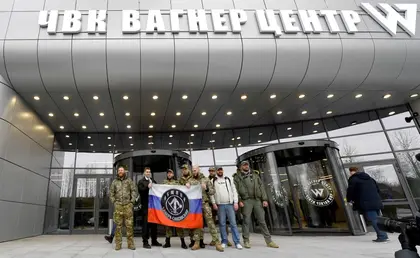War broke out in Sudan last April between the Sudanese National Army and the Rapid Support Forces (RSF) militia. There have been many casualties in addition to the destruction of buildings and airplanes.
Earlier in June, in a bid to strengthen its political position, the RSF militia leader, Mohamed Hamdan Dagalo, better known as Hemeti, sent a political advisor to tour key European countries, aiming to influence decision makers. He promised to keep the immigration control service provided by the militia active. The militia even hired PR companies and journalists to polish its image in Europe.
JOIN US ON TELEGRAM
Follow our coverage of the war on the @Kyivpost_official.
Given the insidious relationship between the RSF and the Wagner group, backed by the Russian government, European countries supporting Ukraine in its war against Russian aggression should not accept any offer by the RSF militia, which would help legitimize it.
The RSF is a rebranded name for the Janjaweed militia, known for its atrocities and war crimes. It was utilized by the ousted regime in areas such as Darfur, South Kordofan and the Blue Nile. It was officially formed in 2013 when the parliament passed a law that organized its activities.
The militia, headed by Hemeti during those years, was engaged in countless human rights violations, which included destroying and burning villages in Darfur, killing peaceful protestors in Khartoum, unlawful detention of activists, and sending children to fight in the Yemen War on behalf of the Saudis.

Russia Starts Mobile Bomb Shelter Production
Its violations included looting residential areas, using churches and hospitals as shields, and raping women for days after taking them hostage.
Over the years, the RSF militia has been aiding the EU in controlling migrant flows by means of the Khartoum process, an initiative between Europe and governments of countries in the migration route from the Horn of Africa. This partnership functions is by providing governments with funding and logistics.
The RSF militia established several detention camps for this purpose in Sudan, and many humans rights groups have criticized the militia’s unfair treatment of those migrants.
The EU has publicly denied these allegations and even announced the suspension of cooperation with Sudan in July 2019, fearing it might be used to suppress peaceful protesters. Nevertheless, some countries, such as Italy, appear interested in continuing their collaboration in disguise.
The RSF militia has also developed strong ties with Wagner, the notorious Russian mercenary group. Indeed, both parties have been trying to keep this relationship from any scrutiny.
In April 2023, the Wagner group denied any involvement in Sudan. Still, the group offered to mediate a stop to the war. By the same token, the RSF militia also published an official statement rejecting any links to the Wagner group, despite ample evidence proving otherwise.
Wagner’s presence in Sudan started in 2017 following a meeting between the deposed Sudanese president and Putin. Wagner’s companies, M-investment and Meroe Gold, have been operating in Sudan. They have been receiving special treatment from the military leadership and facilitating the smuggling and transfer of Sudanese gold to Russia, which is trying to circumvent the sanctions imposed on it after its full-scale invasion of Ukraine.
The military cooperation between the RSF militia and Wagner mercenaries comes in different forms. During the first days of the war, an investigative report by CNN revealed that the Wagner group facilitated the transfer of military aid from Gen. Khalifa Haftar in Libya to the RSF militia. The military support included surface-to-air missiles that would help the militia to balance out the dominance of the Sudanese army over the air.
Wagner was also accused by the US and French Intelligence of shipping anti-aircraft guns and light weapons to the RSF militia from the Central African Republic, where the two groups had fought one another.
The RSF militia also supports the Russian government politically and has endorsed its unjust war against Ukraine. Hemeti arrived in Moscow just one day before the invasion. Talking to the media, the militia leader said openly that Russia has the right to act in the interest of its citizens and protect it borders, and the whole world should realize this.
Some analysts believe Hemeti took $30 million worth of Sudanese gold with him and signed a new deal with the Russians. This visit was attacked by many civilian leaders who think it will help in the isolation of Sudan.
Hemeti later welcomed the construction of a Russian naval base in Port Sudan, the strategic city on the Red Sea, in the east of the country.
Europe, for its part, has appeared to be concerned over the growing influence of Wagner in Sudan, but not its ties with the RSF militia. Yet the two issues are fundamentally intertwined. For instance. In March 2023, the EU decided to impose sanctions on Meroe gold because of activities that endanger international peace and security.
Most recently, a former Tory leader called upon NATO to cut off Wagner’s access to Sudanese gold, Indeed, Wagner chose to gamble and back the RSF militia in this war, knowing that its future in the country depends solely on its militia taking power.
It’s now time for Europe to make a decisive, practical and moral decision in regard to its relationship with the RSF militia. It should not normalize the existence of a militia that jeopardizes peace and stability in the country and region, and whose leader has threatened to throw the whole country into the chaos if anyone seeks to integrate his troops into the national army.
Most importantly, Europe should not shoot itself in the foot by permitting and supporting, even indirectly, one of Putin’s most trusted allies on the African continent.
The views expressed in this opinion article are the author’s and not necessarily those of Kyiv Post.
You can also highlight the text and press Ctrl + Enter






